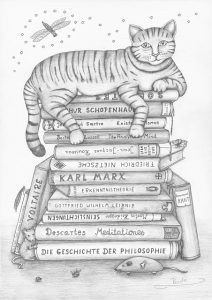
In the Silence of the Mind
The Gardner Room at The Atlantis Bookshop
Languid and listless, a cat sits draped across a tall stack of philosophical works as though he knew that philosophy, the so called ‘love of wisdom’, must amount to more than the mere enjoyment of complex thoughts, even if these lead him to learn of the true, the good, the beautiful, and universal correlation. Learning alone can be no more than a beginning; learning experienced must be the thrilling next step!
Even the silence of the mind beyond earthly knowledge is not the final state but only the bridge to infinite transcendental possibility.
We are delighted to be able to present some of the works of Renate von Charlottenburg. She has been drawing since early childhood and in doing so has developed a highly authentic and distinctive style.
For her, drawing is not an end in itself; rather, it is the artistic opportunity to fathom, experience, and make visible the being and essence of things behind the outward appearance. This essential being gives face and form to the allegorical drawings of Renate von Charlottenburg, allowing them to communicate with the observer in a personified and pithy manner.
Through Renate von Charlottenburg’s metacultural, meta-religious and cosmopolitan approach and perspective, her drawings are able to not only lay bare the roots of Western European culture and attitudes but also to furnish insight into the foundations of other world views, such as that of East Asia.
The delicate, classical and familiar storytelling style of the artist’s pictures makes it easy for viewers to engage with them and immerse themselves.
In this way, the imaginal world of Renate von Charlottenburg provides the wonderful possibility of witnessing the ‘infinite fullness of being’ and rejoicing in it; and behind the seemingly trivial, of discovering the essence of things and the self-creative fairy tale.
Renate von Charlottenburg was born in Bochum. There she studied at Ruhr University, taking several semesters of German language and literature, philosophy and psychology. She then emigrated to India but quickly left for Southern France and soon afterwards returned to Germany, where she spent many years in a secluded house in the countryside before moving her studio to Berlin’s Charlottenburg neighbourhood.